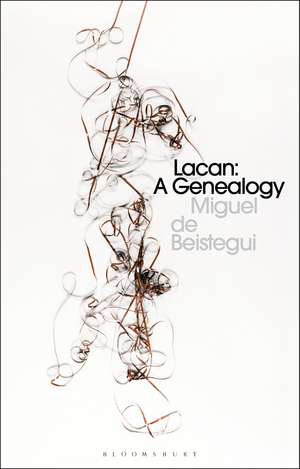Lacan: A Genealogy
Autor Professor Miguel de Beisteguien Limba Engleză Paperback – 27 iul 2022
| Toate formatele și edițiile | Preț | Express |
|---|---|---|
| Paperback (1) | 195.37 lei 6-8 săpt. | +69.59 lei 4-10 zile |
| Bloomsbury Publishing – 27 iul 2022 | 195.37 lei 6-8 săpt. | +69.59 lei 4-10 zile |
| Hardback (1) | 469.88 lei 3-5 săpt. | +21.19 lei 4-10 zile |
| Bloomsbury Publishing – 16 iun 2021 | 469.88 lei 3-5 săpt. | +21.19 lei 4-10 zile |
Preț: 195.37 lei
Preț vechi: 256.58 lei
-24% Nou
Puncte Express: 293
Preț estimativ în valută:
37.39€ • 38.81$ • 31.18£
37.39€ • 38.81$ • 31.18£
Carte tipărită la comandă
Livrare economică 25 martie-08 aprilie
Livrare express 15-21 februarie pentru 79.58 lei
Preluare comenzi: 021 569.72.76
Specificații
ISBN-13: 9781350190818
ISBN-10: 1350190810
Pagini: 184
Dimensiuni: 138 x 216 x 25 mm
Greutate: 0.22 kg
Editura: Bloomsbury Publishing
Colecția Bloomsbury Academic
Locul publicării:London, United Kingdom
ISBN-10: 1350190810
Pagini: 184
Dimensiuni: 138 x 216 x 25 mm
Greutate: 0.22 kg
Editura: Bloomsbury Publishing
Colecția Bloomsbury Academic
Locul publicării:London, United Kingdom
Caracteristici
The author is a very prominent continental philosopher based at one of the main UK centres in continental philosophy, the University of Warwick
Notă biografică
Manuel Beistegui is Professor of Philosophy, University of Warwick, UK. He is author many books and articles in Continental Philosophy including The Government of Desire: A Genealogy of the Liberal Subject (2018), Proust as Philosopher: The Art of Metaphor (2012), Aesthetics After Metaphysics (2012), Immanence: Deleuze and Philosophy (2012)
Cuprins
IntroductionChapter 1: Denaturalising DesireChapter 2: Paranoid PsychosisChapter 3: Crime and PunishmentChapter 4: Lacan with Kant Chapter 5: Lacan with Marx Conclusion
Recenzii
Miguel de Beistegui offers us an extensive and intriguing genealogy of the central Lacanian concept of desire. On the one hand this genealogy is undertaken in Foucauldian spirit, extending the critical assessment of psychoanalytic focus on desire and Law, but on the other hand the book also convincingly shows how Lacan's project exceeds this framework and offers powerful tools for critical thought and radical engagement with the liberal logic of desire. Insightful and absorbing.
No superlative can do justice to the originality of this book. Using the notion of desire as a key to unlock the hermetic seal of Lacan's writings, de Beistegui demonstrates how the psychoanalyst's work generates a conception of subjectivity that allows for a radical reinterpretation of contemporary debates around self-governance, power-relations and identity politics. I have always known that only a non-Lacanian would be capable of taking Lacan's thought outside the conceptually sterile, dogmatic cult into which it has descended, but this is by far the best book on Lacan I have read in the past decade.
No superlative can do justice to the originality of this book. Using the notion of desire as a key to unlock the hermetic seal of Lacan's writings, de Beistegui demonstrates how the psychoanalyst's work generates a conception of subjectivity that allows for a radical reinterpretation of contemporary debates around self-governance, power-relations and identity politics. I have always known that only a non-Lacanian would be capable of taking Lacan's thought outside the conceptually sterile, dogmatic cult into which it has descended, but this is by far the best book on Lacan I have read in the past decade.
